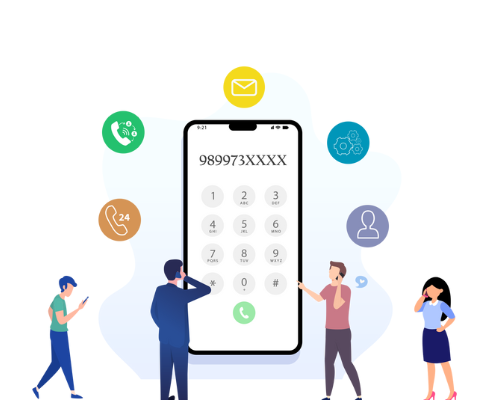
Businesses are constantly exploring innovative solutions to enhance communication and connectivity. One such technology that has gained popularity is virtual numbers. However, questions often arise regarding their legality, especially in countries like India. In this blog, we’ll delve into the concept of virtual numbers, how they operate, and address the legality of using virtual numbers in India. To operate the number while following the rules, you need a reliable virtual mobile number services provider in India.
What is a virtual number?
A virtual number, also known as a cloud-based or online number, is a telephone number that operates over the internet rather than through traditional phone lines. It allows businesses to make and receive calls from anywhere, providing flexibility and scalability crucial for modern operations. Virtual numbers can be obtained from various service providers and offer features such as call forwarding, voicemail transcription, and auto-attendance.
How to Get a Virtual Number
Acquiring a virtual number for your business is a straightforward process. Begin by researching reputable virtual number providers that offer services in India. Once you’ve chosen a provider, sign up for their services and select a virtual number that aligns with your business needs. You may need to verify your identity or business details to activate the virtual number. Customize features such as call forwarding and voicemail greetings according to your preferences. With the virtual number set up, you can start using it to make and receive calls via the internet.
How Does it Work?
- Initiating a Call: When a caller dials a virtual number, the call is first routed through the traditional phone network until it reaches the service provider’s infrastructure. This initial part of the journey occurs over standard telephone lines.
- Transition to VoIP: Upon reaching the service provider’s infrastructure, the call undergoes a crucial transition. The signal is converted from analog to digital format, marking the shift from the traditional phone network to VoIP technology.
- Routing via Internet Protocol (IP): With the call now in digital form, it is transmitted over the internet using Internet Protocol (IP). This allows for the seamless transfer of data packets across networks, irrespective of geographical distance.
- Provider’s Servers: The call is directed to the service provider’s servers, which act as intermediaries in the transmission process. These servers play a pivotal role in managing call routing, maintaining call quality, and implementing additional features offered by the virtual number service.
- Destination Identification: At this stage, the virtual number service identifies the destination of the call based on predefined settings configured by the user. This could involve routing the call to a specific phone number, extension, or device, depending on the user’s preferences and requirements.
- Forwarding to Destination: Once the destination is determined, the call is forwarded to the designated endpoint. This could be a mobile phone, landline, VoIP device, or any other compatible communication device capable of receiving calls.
Legality of Virtual Numbers in India
The use of virtual numbers in India is legal, provided they comply with the regulations set forth by the Department of Telecommunications (DoT). Businesses must ensure that their virtual number service provider is registered with the Telecom Regulatory Authority of India (TRAI) and adheres to the guidelines established for VoIP services.
Regulatory Compliance
Businesses and service providers offering virtual number services in India are required to adhere to regulatory requirements set forth by the DoT and TRAI. This includes obtaining the necessary licenses, registrations, and approvals to operate as a telecommunications service provider.
Specific Regulations
While virtual numbers themselves are legal, there are certain regulations and restrictions that businesses must be aware of when using them. Some key considerations include:
- Data Privacy: Businesses must comply with data privacy laws and regulations when handling customer information obtained through virtual number services. This includes obtaining consent for data collection, processing, and storage, as well as implementing measures to safeguard sensitive information.
- Call Recording: In India, there are specific regulations governing the recording of telephone conversations. Businesses using virtual numbers for call recording purposes must comply with these regulations, which may require obtaining consent from all parties involved in the call and adhering to data retention policies.
- National Security: Virtual number services are subject to national security considerations, particularly regarding the interception and monitoring of communications. Service providers must cooperate with law enforcement agencies and government authorities to facilitate lawful interception requests and ensure national security interests are protected.
Penalties for Non-Compliance
Failure to comply with regulatory requirements related to virtual numbers in India can result in penalties, fines, and legal consequences for businesses and service providers. Non-compliance may also damage reputation and trust among customers and stakeholders.
Conclusion: In summary, virtual numbers are legal in India, but businesses must ensure compliance with applicable laws and regulations governing telecommunications and data privacy. By adhering to regulatory requirements, businesses can leverage virtual numbers effectively to enhance communication and connectivity while mitigating legal risks and ensuring compliance with the law.
SpaceEdge Technology: Virtual Number Services Provider in India
SpaceEdge Technology emerges as a pioneering force, redefining the realm of virtual number services in India. With a commitment to innovation and excellence, SpaceEdge is revolutionizing the way businesses and individuals connect, communicate, and collaborate.
Read more: https://emperiortech.com/











